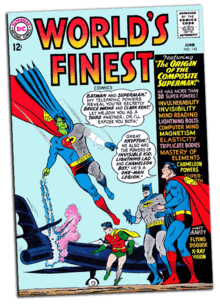- Superpower (ability)
-
 The cover of World's Finest #142, featuring the Composite Superman, a character with over 20 different powers, in action. Art by Curt Swan.
The cover of World's Finest #142, featuring the Composite Superman, a character with over 20 different powers, in action. Art by Curt Swan.
Superpower is a popular culture term for a fictional superhuman ability. When a character possesses multiple such abilities, the terms super powers or simply powers are used. It is most frequently used in pulp magazines, comic books, science fiction, television shows and film as the key attribute of a superhero.
The concept originated in pulp magazines and comic books of the 1930s and 40s, and has gradually worked its way into other genres and media.
Contents
Definition
There is no rigid definition of a "superpower". In popular culture, it may be used to describe anything from minimal exaggeration of normal human traits, magic, to near-godlike abilities including flight, projection of destructive energy beams and force fields, invulnerability, telepathy, telekinesis, teleportation, super-speed or control of the weather.
Generally speaking, exceptional-but-not-superhuman fictional characters like Sherlock Holmes, Doc Savage, Batman, and Green Arrow may be classified as superheroes although they do not have any actual superpowers.
Similarly, characters who derive their abilities from artificial, external sources—the Six Million Dollar Man and his bionic limbs, Green Lantern and his power ring and Iron Man's armor, and Captain Olimar's Pikmin may be fairly described as having superpowers, but are not necessarily superhuman.
Explanations in Fiction
In fiction, seemingly impossible superpowers of superheroes are sometimes given scientific, quasi-scientific, pseudo-scientific or outright supernatural explanations by writers. Most, however, are impossible with current technology and physical laws.
Superpowers based on possible current or future technology, such as machine suits, rockets, bionics and genetic manipulation for example, have their roots in science and science fiction. Superpowers based on Psychic and paranormal powers, for example have their roots in pseudo-science. Other superpowers may be explained using mythology.
Origin of the term
The earliest known use of the word superpower was in 1920, in reference to the term for the powerful nation (see superpower).
In comics, the first references to superheroes with superhuman abilities was at about the same time. At first, superpowers were first poorly described.[citation needed] Superhuman characters simply were able to achieve whatever the narrator or writer of a story needed him or her to do to fulfill its part in the story. This was also true in the early years of superhero comic books.[citation needed]
As the years passed and more characters were created, however, a greater variety of abilities was invented, in an effort to be distinctive. An example of this can be seen in the way Superman's powers developed over the years. Certain comic book series were created specifically to explore the possible varieties of superpowers[citation needed]. Examples of this include DC Comics’ Legion of Super-Heroes (which included the concept of would-be members being required to pass tests to determine if their powers were useful) and Marvel Comics’ X-Men series, where a school for training mutants to use their powers was a central concept. Characters with multiple powers, often copied or stolen from others, such as the Composite Superman or the Super-Skrull also started to appear.[citation needed]
In the 1970s, role-playing games began to develop, and soon superhero-based ones were developed as well. The game designers were faced with the dilemma of how to catalogue superpowers for their use in the games.[citation needed] At first the designers simply borrowed names and effects from the comics; however they soon realized that there was a redundancy of abilities as some characters' powers differed from others only in minor details like name or visible effects. The Champions role-playing game took a radical departure in describing powers by their effects rather than their causes; for example a laser and a lightning bolt were both considered to be versions of the same power, named Ranged Attack. Another fact they realized is that some powers were simply more useful than others in game terms; to represent this, each power was given a "value" in a point system, with the more powerful abilities costing more to "buy". In addition, players were given options to modify their powers so each character's abilities would be unique. This system has since then influenced many other similar games.
In an attempt at greater realism, the causes and effects of superpowers have been considered more carefully by writers.[citation needed] The possible origins for powers include natural mutations, genetic manipulation, bionics, natural forces unique to a particular universe (such as DC Comics' Speed Force or Marvel Comics' Power Cosmic and even magic). In the 1980s, Marvel Comics began publishing their Official Handbook of the Marvel Universe series, in which the powers of their characters were explained in great detail, often using scientific and pseudoscientific terms.
Eventually, the powers became a focus of the stories. Inspired by social science fiction, these stories went beyond the simple acceptance and use of superpowers in the roles of superheroes and supervillains and explored their effects in society at large. An example of this is the persecution of mutants in the X-Men series.[clarification needed] An important difference[clarification needed] is that science fiction usually posits superpowered minorities as having mainly the same kind of powers (for example, the telepaths in A. E. van Vogt's Slan) while in comics each superhuman is usually unique.[citation needed]
See also
External links
- Superpower List - A growing list of user-submitted superpowers.
- Superhero Database: Superpowers
- 8 Super Powers, an online Wired Magazine article on how certain superpowers might work
- The Physics of Superheroes, by James Kakalios- a book examining how the powers of several comic book characters would work if they were real.
Superhero fiction Media Plot elements Superhero · Supervillain · Superpower (List) · Secret identity · Alter ego · Comic book death · Women in RefrigeratorsContinuity Categories:- Fictional superhuman features or abilities
- Fictional concepts in comics
Wikimedia Foundation. 2010.
